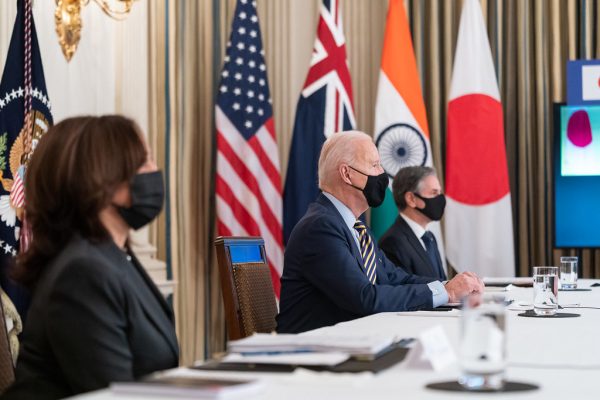
The newly created trilateral security partnership between Australia, the United Kingdom, and the United States (AUKUS) has become instantly, probably understandably, controversial across the Indo-Pacific and beyond. The planned acquisition of nuclear-powered submarines clearly adds to the heft of Australia in terms of its naval deterrent capabilities against China’s growing naval power, which has been on aggressive display for the last few years, though it will take some time for Australia to deploy those new capabilities. More importantly, it also adds to a further strengthening of other minilaterals in the Indo-Pacific including the Quad involving Australia, India, Japan, and the United States.
India’s formal response to AUKUS came during a recent special media briefing by Foreign Secretary Shri Harsh Vardhan Shringla, in which he stated that AUKUS “is neither relevant to the QUAD, nor will it have any impact on its functioning.” Others have suggested that the new arrangement will dilute the importance of the Quad.
But in reality, AUKUS is both relevant and important in the context of the Quad for a couple of reasons. The three leaders themselves, while announcing the trilateral security partnership, emphasized the importance of ongoing partnerships such as with ASEAN, the Quad, and other Indo-Pacific partners including from Europe, including France, which has a direct material stake in the Indo-Pacific. Just as the Quad has a shared vision of ensuring a region that respects freedom and the rule of law, AUKUS is also founded on a similar vision.
There has been a boom in the number of minilateral partnerships in the Indo-Pacific in recent years, all arguably complementing each other with a shared sense of purpose. India itself is party to a number of them. Interestingly, these new partnerships have involved one or two of the Quad partners expanding the Indo-Pacific strategic matrix to involve one or two non-Quad members, which is a way of bringing more countries to endorse the central purpose of these minilaterals – to balance China. They have been more political and diplomatic partnerships, with militaries undertaking joint exercises in order to strengthen interoperability to respond to a range of possible contingencies that might emerge in the region. AUKUS has a stronger military component to it with Australia’s plans to acquire nuclear-powered submarines for the Australian Navy, as a trilateral endeavor.
But the long-term goal of AUKUS is complementary to the Quad and other minilateral partnerships – including trilaterals like Australia-India-Japan, India-Japan-U.S., Australia-India-Indonesia, Australia-France-India, and India-Italy-Japan – in the region. While some of these trilaterals are only among the Quad countries, others involve non-Quad countries in an effort to bring more partners into the Quad’s orbit by expanding and involving partners which share similar regional strategic interests. AUKUS in that respect is no different. The current efforts at building larger number of coalitions with shared political ideals and strategic interests has the net effect of generating larger political and strategic consensus. These are important milestones. Additionally, if these partnerships can build up military power in a decisive way as effective deterrent against China, such steps need to be welcomed. A militarily capable Australia is in India’s interests as well as that of the wider region.
The Philippines came out with one of the more substantive responses to how AUKUS corrects the regional strategic imbalance. Philippine Foreign Secretary Teodoro L. Locsin, Jr. in a statement said that “The Philippines welcomes Australia’s decision to establish an enhanced trilateral security partnership with the United States primarily and the United Kingdom.” He went on to add that “there is an imbalance in the forces available to the ASEAN member states, with the main balancer more than half a world away. The enhancement of a near abroad ally’s ability to project power should restore and keep the balance rather than destabilize it.”
Among the other ASEAN countries, the response to AUKUS appears to be mixed. Malaysia, for instance, has decided to send its defense minister to China to understand the Chinese reaction to AUKUS. This is despite the fact that Malaysia and many of the South China Sea countries have been complaining about multiple breaches of air and naval spaces by China. Just this summer, commenting on Chinese military aircraft flying over disputed waters off its eastern state of Sarawak, Malaysian Foreign Minister Hishammuddin Hussein said the planes were in “breach of the Malaysian airspace and sovereignty.” Malaysia has thus had a somewhat confusing approach in its dealings with China and the emerging strategic partnerships in the region. Malaysia also has close ties with Australia, recently enhancing their relationship to a “Comprehensive Strategic Partnership,” which also makes its reaction to AUKUS surprising.
Nevertheless, there are skeptics in Indian strategic circles as well. For instance, a former naval chief, Admiral Arun Prakash, complained that AUKUS is an exclusive club that has left out two of the Quad members – India and Japan. On the other hand, it makes very little sense for every minilateral to include every single Quad member. As Sreemoy Talukdar aptly wrote, “AUKUS is a significant step towards managing the geopolitical turbulence in the Indo-Pacific, and it will complement, not diminish the importance of Quad.”
AUKUS is an important development because it signifies the capability augmentation of one of India’s closest strategic partners, with whom it has just started a 2+2 ministerial dialogue. A strong and capable Australia is in India’s interests, that of the Quad and the broader Indo-Pacific region. It is also significant because the U.K., after going back and forth on China, is now firmly entrenched in the Indo-Pacific in countering China.

0 Comments